To optimize content for search engines, keyword research is crucial (SEO). It's regarded as the top priority for many businesses. In fact, as of today, in 2022, Google has tallied over 2 trillion searches. With such a startling statistic, it is clear why keyword research is necessary. It's crucial to reach more consumers, but in order to reap the rewards, you must also reach the right ones. In this article, we'll explain what keyword research is, why it's crucial for your website or business, and all the best practices for carrying it out effectively. Let's go for it!

What is a Keyword?

A "keyword" is a word or phrase that describes the subject matter of your content. When discussing SEO, a "keyword" is a term that an internet user enters to search for a topic that interests them. You probably already know that you type search terms into Google or other search engines to get results unless you've been living under a rock.
For instance, you might look up running advice if you want to start out as a casual runner. Maybe you're looking for the best running shoes. You're most likely going to look for the best running shoes. Those are keywords, and anyone who uses a search engine makes use of them.
Introduction To Keyword Research?

The process of choosing the keywords you should include in your written content to help drive traffic to your website is known as "keyword research." Businesses and marketers use the method of keyword research to find out what people are looking for. It's how they determine which words are the most widely used.
Create Amazing Websites
With the best free page builder Elementor
Start NowEffective keyword research (SERPs) is used to improve SEO rankings on the search engine results pages. This can be done with both new and old content. Both SEO and general marketing goals can benefit from keyword research. Furthermore, when developing new page content or products, keyword research can help marketers find words they may not have otherwise considered.
Why Keyword Research is Important for SEO

There are many advantages to keyword research. Gaining insightful knowledge about your audience, the potential for more organic traffic, and better search engine rankings are a few of them.
Reveals Valuable Insight into Your Audience
By revealing the terms that your target audience is searching for, keyword research will help you understand what they want. You'll discover the queries they are posing to search engines in order to get assistance with issues they are having. Keyword research can help you reach potential customers who are looking to buy running shoes if your company sells them. Using a keyword research tool is one effective way to measure this. They are excellent resources for assisting you in learning what people are looking for based on a particular search term. There are numerous tools available that can be useful. Later, we'll talk about those briefly.
Increases Your Organic Traffic
Organic traffic is traffic that your SEO-optimized content has earned for you. And your search engine ranking rises as you receive more organic traffic. Additionally, since organic traffic is free, marketing experts agree that spending time and effort on an effective keyword strategy and other SEO tactics is worthwhile. This enables you to climb the search results pages without using PPC advertising. Additionally, you will have a much higher click-through rate than even paid ads if your content is ranking highly organically.
Improves Ranking in SERPs
You can improve your position in search results by conducting keyword research. More people will be able to find you based on their search terms if you use the right keywords. You have a greater chance of being seen and drawing more visitors to your website when you climb the search engine rankings.
Acquires more Customers
You are better suited to meet their needs if your website has strong SEO copywriting and keywords that target the right consumers. It's a smart idea to research keywords based on search intent rather than volume in order to increase your revenue.
Building An SEO Keyword Strategy

It is advantageous to have a solid strategy in place before beginning your keyword research. By doing this, you'll be more likely to select the appropriate keywords, achieve better search engine rankings, drive more traffic to your website, and attract new clients. Your overall SEO strategy, which includes creating SEO content and employing sound SEO practices, will be greatly aided by a solid keyword strategy. Here are a few key components to consider when developing a keyword strategy for your website.
Know Your Business (what you are offering)
A great starting point for keyword research is to have a thorough understanding of your website or business, as well as what you have to offer (products, services, content, etc.). This makes it easier to decide what kinds of subjects and content to include on your website. If your business offers hosting services, your website probably has information (landing pages, blog posts, etc.) about those services (such as "WordPress hosting" or "Page Speed Optimization"). provides you with a starting point for your keyword research.
Know your Audience (what they are searching for)
You must think about what your audience (or potential customer) is looking for in addition to what you have to offer. It's probably better to first understand what your specific target customer is looking for on your site before researching keywords that a general audience is searching for. Based on customer personas and/or customer journey maps, you may already have a good idea of what this is. You can find the right keywords that will increase both site traffic and conversion rates by having this understanding of your target audience.
Know Your Competition
When it comes to keyword research, knowing what your competitors are doing can help you decide what to do and what to avoid. If you don't already know who your main competitors are, take the time to find out. To outrank your direct competitors in the search results, you must conduct research on them. Take a look at the types of articles they are writing, the subjects they are covering, and which ones are doing the best. This will assist you in creating a keyword strategy that, in many ways, mimics the tactics of your rivals. Additionally, you will be able to note their top keywords and see if they are missing any high-volume keywords that would be beneficial for your company.
Know Your Search Engines
It will be easier for you to replicate the process for your own keyword strategy if you understand how search engines index top-ranking content in accordance with keyword usage. Learning about Search Engine Ranking Pages (SERPs) and how they index and display featured snippets based on the keywords you use and the organization (or schema markup) of your content is also a good idea.
Know Your Data
You can evaluate your current content and get suggestions for new topics or keywords to pursue by looking at the data collected by Google Analytics and the Google Search Console on your website. Learn everything you need to know about the current state of your content and the content of your competitors by using the analytics tools at your disposal.
Finding the Right SEO Keyword Research Tools
You can find a ton of free SEO tools that can help you with keyword research and SEO. Consider using excellent tools like SEMrush, Ahrefs, Moz, and the Google Ads Keyword Planner.

How to do Keyword Research (Essential Steps)
There are a few guidelines you can use to conduct keyword research successfully. Let's talk about each one separately so that you can better understand how to improve SEO on your website.
Make a List of Topics that Make Sense for you and your Audience
You must have a clear idea of the topics and keywords you want to target before conducting in-depth keyword research. The most effective ones will make sense for both your company and your potential customers. This is why it will be beneficial to have a thorough understanding of both your company and your target market.
Using the content that is most pertinent to you, generate some keyword ideas. Choose 5–10 topics to focus on as a starting point for your research. These are probably going to appear repeatedly on your website and are the most important in your content (like the main categories for a blog). Additionally, look into hot topics to see what people are searching for that you could produce content for.
Consider Search Intent and Related Search Terms for Topic Ideas
In terms of matching searches to user intent, Google is the master. As a result, you can perform keyword research for your own brand using Google's search bar. You can find a ton of topic ideas for your website using this method, and you can also find some great secondary keywords. Three Google features—autocomplete, people also ask, and related searches—can generate high-volume keywords.
Google Autocomplete
When you begin to type a keyword into the Google search bar, autocomplete appears. Google will try to anticipate your next keystrokes by compiling a list of the most popular user searches. Predictions are modified as you type based on the characters you enter. Let's use the example of our running shoes. Google will autocomplete a list of frequently searched terms related to running shoes as you begin to type.
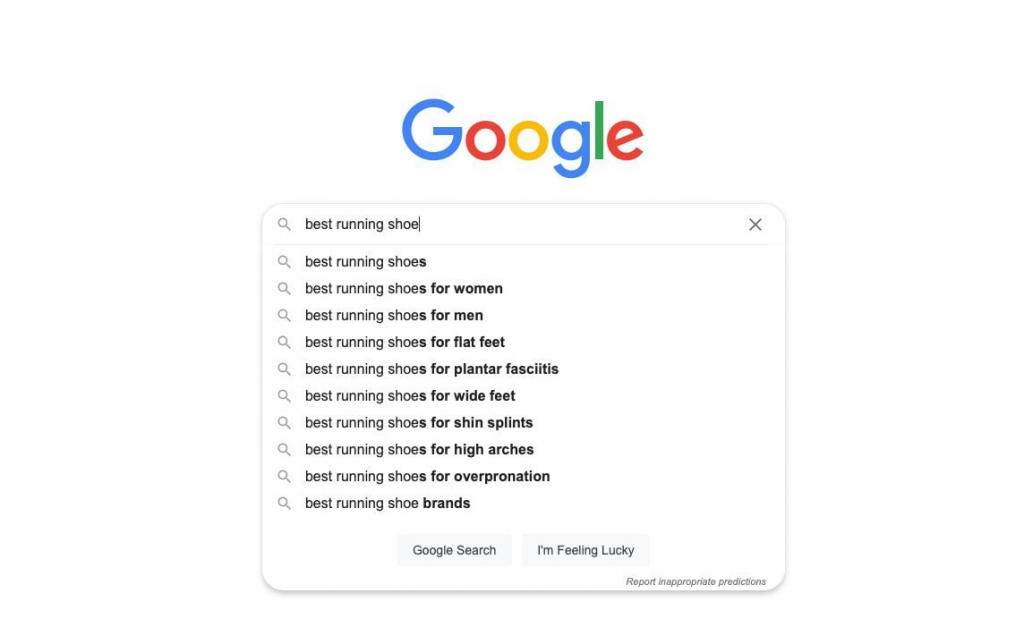
Using just this one Google feature will provide you with a wealth of information.
People Also Ask
You'll find a section labeled "People also ask" below the first few results after entering a search term into the search bar. Additional questions or terms will appear when you click through those results. These are the inquiries about that particular search term that are most frequently asked. Talk about a lot of searches! Let's look at the search term "running shoes" once more. Google returns this set of terms after running the query.

Google presents us with even more queries full of high-volume keyword options as we scroll through the results.
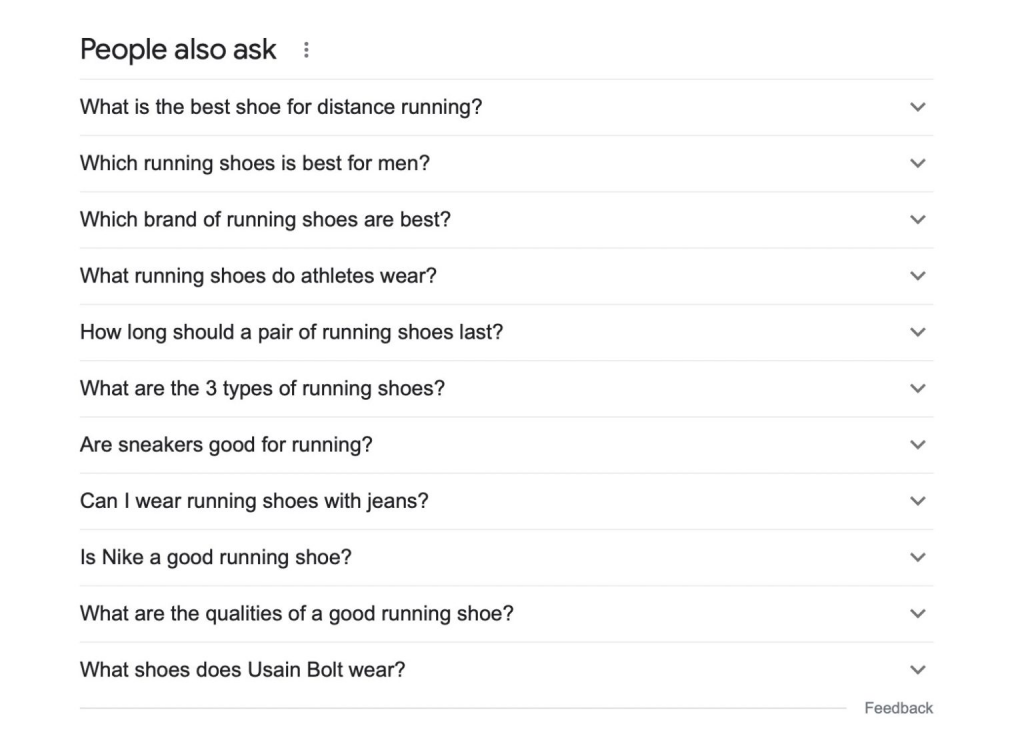
If you use this method, you might also get ideas for blog posts as well as suggestions for keywords.
Related Searches
Consider looking up related search terms to get some inspiration for keywords in addition to user intent. Consider using Google to look up running shoes as an example. Google gives you a "people also ask" section with a few frequently asked questions below the top search results. This is a crucial step that many keyword research strategies skip. They are referred to as "seed" keywords. They serve as a general foundation for creating longer keywords with modifiers. One or two words can make up a seed keyword, and they are prime candidates for optimization.
Google will show you a few frequently asked questions about the subject you searched for in an effort to anticipate your next query. This present from Google has a lot to offer. By way of illustration, you might concentrate your search on the top-rated running trainers as well as the best brand of running shoes or trending running shoes.

Google will also suggest related searches to you. These are potential searches based on the initial keyword search for "running shoes." In some cases, you may even receive some brand names to use in your keyword research. Good marketers frequently include keywords in their meta descriptions and title tags. Look through the first few pages of Google search results and pay attention to those sections as well.
Once you've compiled a solid list of potential topics and keywords, you can start looking into how well they're currently doing in the search engines and use that information to narrow down your list.
Important Factors to Look for When Researching Keywords
When researching keywords, there are a few crucial aspects to take into account. When creating keywords for your website, taking into account keyword difficulty, search volume, and search intent is highly beneficial.
Keyword Difficulty
The keyword difficulty is prioritized. This is a description of how challenging it will be to rank for a specific keyword. The harder it will be for your term to rank in search results, the higher the score. You can choose whether or not to modify your content to use that specific keyword once you know how high the ranking is.
You can use the free Keyword Generator tool from Ahref to aid in your research. Just enter a keyword, and the free version will show you the top 100 terms that are related to your search. Additionally, you'll be able to see queries made in connection with your keyword, which is a great tool for choosing keywords. The keyword difficulty rating will be displayed after the first 10 results.
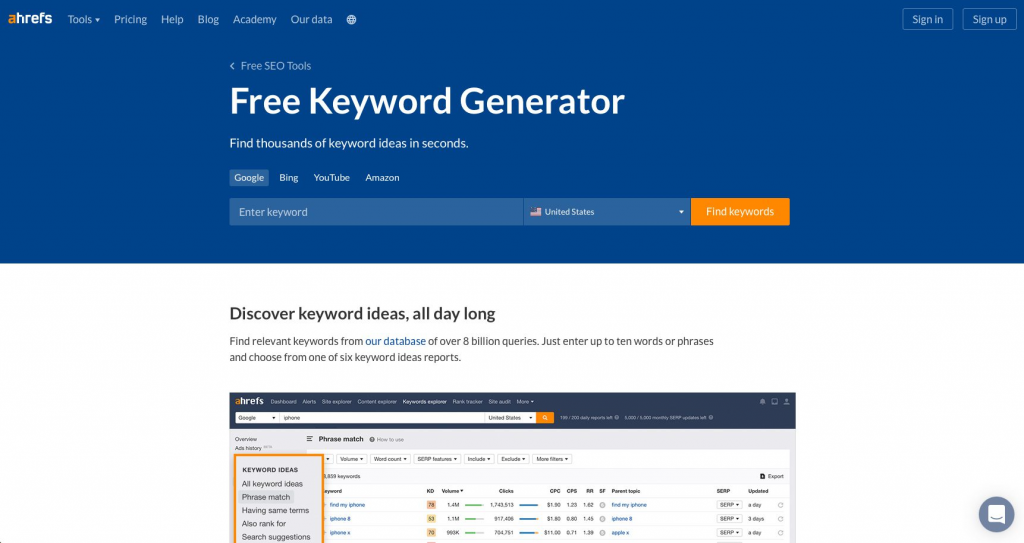
Search Volume
This refers to the frequency with which a specific keyword is searched for at any given time. Finding the typical monthly search volume is a good place to start. Although search volume can teach you a lot, you should still be skeptical of the findings. Even though a keyword may receive a lot of searches, this does not necessarily translate into more visitors to your website. More competition generally results from a high search volume.
Say, for illustration, that the keyword "running shoes" receives 20,000 searches each month. Despite being a large number, it does not reflect the searchers' motivations. Another thing to keep in mind is that it doesn't necessarily mean that everyone who looked for it clicked on it. Many times, people will find their desired outcome in Google and move on. Having said that, your content must still be pertinent to what people are looking for. Therefore, it makes sense to consider search volume when conducting keyword research.
Search Intent
Google is going to start emphasizing search intent much more going forward. It will be much more difficult to rank in search engines if you don't take the user's search intent into account when choosing your keywords. A large number of SEO plugins and tools will show the keyword's search intent. Learn about the different categories of search intent and use that knowledge to your advantage when selecting keywords for your website. The various search intent categories are as follows:
- Navigational: Are they searching on Google with a navigational purpose? As opposed to going straight to a URL, someone might search for the terms login or sign up.
- Informational: This indicates that they are looking for information on a subject or solution.
- Investigation: A user is searching for a specific type of product. They are probably looking for reviews or comparisons to help them choose the best product.
- Transactional: This user is prepared to make the purchase because they are aware of what they want. They are probably looking for the best deal right now.
In actuality, you should make sure that the intention behind a user's keyword search aligns with the objective of your content. For instance, if the objective of your content is informational, you shouldn't attempt to rank for a keyword that has a transactional (or commercial) search intent. Even if your traffic spikes briefly, users won't benefit as much in the long run.
Start Grouping Keywords by Topic
You can begin organizing keywords under each of your main topics and keywords once you have them. The act of clustering or grouping a set of keywords together is known as keyword grouping. Include a variety of relevant keywords and keyword variations, such as questions, long-tail keywords, and short (stem) keywords. You should be able to get a ton of results from a keyword research tool that contains pertinent information to help you organize your keyword lists.
Using a spreadsheet is one easy way to begin grouping keywords. Include related keywords under each of your main keywords (or topics) in the list. Then, add a column for search volume and color-code each keyword according to its keyword difficulty. You can use this to find out for whom you should start making content.
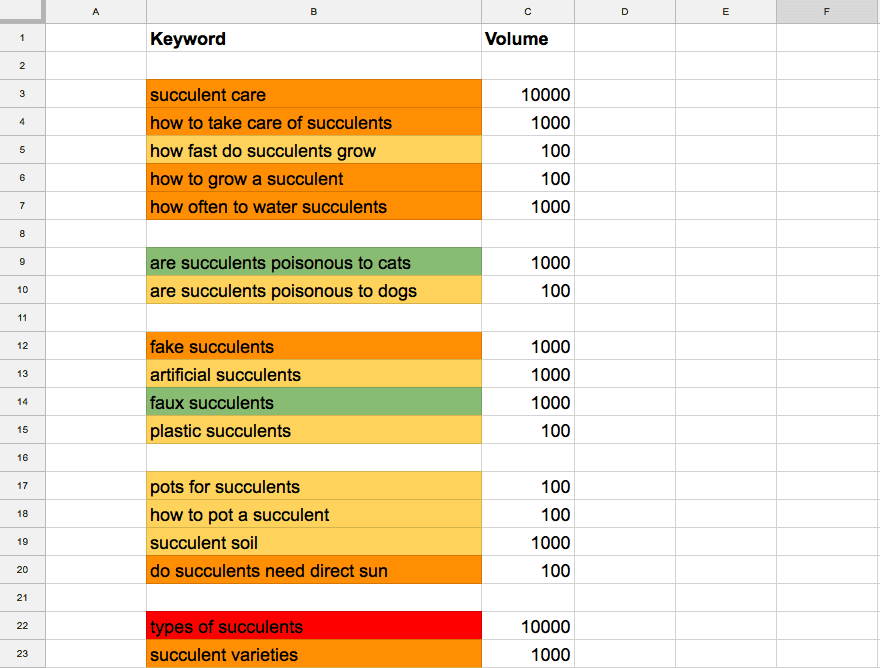
You can begin organizing keywords under each of your main topics and keywords once you have them. The act of clustering or grouping a set of keywords together is known as keyword grouping. Include a variety of relevant keywords and keyword variations, such as questions, long-tail keywords, and short (stem) keywords. You should be able to get a ton of results from a keyword research tool that contains pertinent information to help you organize your keyword lists.
Using a spreadsheet is one easy way to begin grouping keywords. Include related keywords under each of your main keywords (or topics) in the list. Then, add a column for search volume and color-code each keyword according to its keyword difficulty. You can use this to find out for whom you should start making content.
Be Realistic about the Keywords you choose
If your domain authority is high, you might be able to select more difficult and competitive keywords. If you are just getting started, you should search for keywords that are less competitive but still have a volume of searches that are worthwhile. Generally speaking, it is best to start with those you have a good chance of placing first. Then, as your content and authority grow, you can target those challenging keywords.
Most keyword research tools will show you different keyword variations along with their current volume and difficulty. This will help you choose the best keyword for your keyword strategy.

The stem (or seed) keywords are typically the ones that are hardest to rank for. Don't be afraid to target long-tail keywords, particularly those that are expressed as questions. Occasionally, these will provide the best outcomes given how heavily Google weights user intent (not to mention how many voice searches are being conducted in the form of a question on mobile these days).
Look for short and long-tail keyword variations for your content
Google will object if a keyword or phrase is used too frequently on a post or page. It's thought that this is keyword stuffing. It is best to mix up your target keyword with various keyword variations, such as short- and long-tail keywords, to avoid this. Researching keyword variations for your keyword is crucial for this reason.
Remember to use your target keywords only when they make sense when writing your SEO content. Google will probably take note if the user finds it awkward or forced. Utilizing keyword stemming, which enables you to divide a target keyword phrase across an entire sentence and still be recognized as that target keyword, is one effective way to achieve this.
Take a Long Hard Look at Your Competitors
Conduct a keyword gap analysis or competitive keyword analysis to gain an advantage over your rivals now that you are aware of what your keywords are and how to balance long-tail and short-tail keywords. Make a note of their top-ranking keywords and check to see if any high-volume keywords that would be useful for your company are missing. On the other hand, you could actively compete with your competitors by using their top keywords to try to steal their customers.
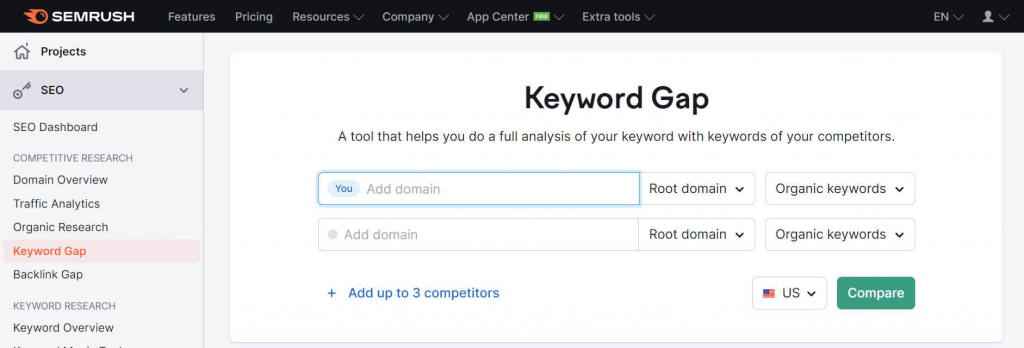
You can use a variety of tools to learn what your rivals are doing. SEMrush, Google's Keyword Planner, or even just using the source code of a rival website are all options. Using Chrome, for instance, right-click the page and select View Page Source. Look for components like the title, meta, and h1 tags as soon as you have access to the source code.
Keep track of your keyword performance
It's crucial to monitor your keywords' performance after you've taken steps to research them in order to aid you in your pursuit of high rankings. To achieve the desired results, adjustments might (and probably will) be required. You can increase the effectiveness of your content strategy and boost website traffic by using keyword-tracking tools. Keyword tracking can give you fresh keyword suggestions to use in your content in addition to monitoring your current keywords.
Wapping Up
Your overall SEO strategy must include keyword research. Knowing your keywords and checking to see if they complement your content will go a long way toward helping your website rank well in search engines.
Keep in mind that you need the right tools to do good keyword research and come up with a list of the best keywords. It's then up to you to write the content effectively using those keywords. If you use Divi, you may want to think about using the AISEO plugin to assist you in selecting and including the appropriate keywords on your product and category pages.




